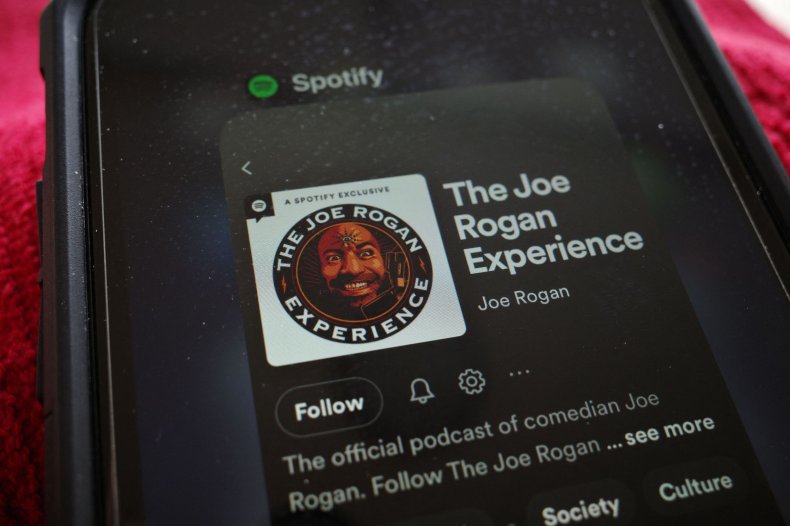[From partners in the original war on terrorism, to the enemies that we appear to be today, what went wrong with the US/Russian era of cooperation? We went our separate ways in 2003, when Bush began his vendetta against Saddam Hussain and "Seven countries", former client states of the Soviet Union in the Middle East. Next, came the first anti-Russian "color revolution" in Ukraine in 2004, followed by a 2nd color revolution in 2014-15...all elements of an economic war against the Russian oil/gas industry (Gazprom), intended to bankrupt Russia by surgically removing key state Ukraine from that supply system, thereby destroying the heart of the Russian economy. "Independent Ukraine" has always been a pauper state, dependent on the generosity of Russia to furnish the base energy needs of its own people, choosing instead, to act as an nonpaying parasite on the Russian suppliers, as the price for allowing Russia to transit gas through Ukraine to the rest of Europe, or else to shut-down. When Russia chose to pipe its energy around Ukraine in new pipelines, the US waged further economic warfare against every project, promising Europe non-existent American LP Gas to replace the missing fuel. With the American-induced cancellation of both Northstream and Turkstream projects, Russia (Gazprom) had to retrench in Ukraine to continue to service Europe. Further U.S. attempts to strangulate the Russian economy and to isolate Putin run great risk of bringing about world war.]
Cold War-style confrontation between US and Russia focuses on energy rather than military
2009 German Analysis Documenting US Plan To Unleash Civil War In Ukraine
Voters’ rights group inciting “Orange Revolution”?
Obama, The Devil, Is Luring the World Over the Nuclear Threshold In Ukraine
At What Point Will Putin Bend Under Obama's Ukraine Extortion?
Why Is World War II Being Rekindled in Ukraine?
As the battle of wills and might between Russia and the west over the fate of Ukraine unfolds, there is one key fact to bear in mind: Vladimir Putin has never lost a war. During past conflicts in Chechnya, Georgia, Syria and Crimea over his two decades in power, Putin succeeded by giving his armed forces clear, achievable military objectives that would allow him to declare victory, credibly, in the eyes of the Russian people and a wary, watching world. His latest initiative in Ukraine is unlikely to be any different.
Despite months of military build-up along Ukraine's borders and repeated warnings from the Biden administration that an incursion could happen at any time, the February 24 pre-dawn bombing campaign that kicked off Europe's first land war in decades seemed to come as a surprise to many Ukrainians. In major cities across a country the size of the state of Texas, stunned citizens, lulled into complacency by their president's repeated reassurances that Russia would not invade, watched and listened to the sound of thunderous explosions targeting Ukrainian military bases, airports and command and control centers. Within 24 hours, the conflict spread rapidly, with Russian tanks and troops moving swiftly toward Kyiv, the capital, and fighting around Chernobyl, the site of the disastrous 1986 nuclear reactor meltdown. Shock and awe, Russian style.
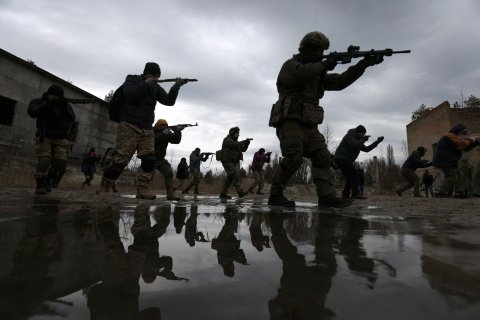
In an instant, Russian President Putin's invasion of Ukraine destroyed the post Cold War security order in Europe—one centered, to Russia's fury, by an often-expanding NATO alliance. Analysts expect that, once Kyiv falls, the military aggression will give way to a political settlement that puts a Russia-friendly government in place. By February 25, Ukrainian President Volodymyr Zelensky was considering an invitation from Moscow to hold "neutrality" talks in neighboring Belarus. If those talks happen, Putin will then be able to pull back troops and end the conflict—while having dealt the West a humiliating blow.
And that, military and Russia experts agree, may be the real point.
Ukraine, of course, is not a NATO member; the possibility that it might join the Alliance some day, as other countries that were once part of the old Soviet bloc have done, is a key issue in the current conflict. Putin's actions, a brazen defiance in the face of repeated warnings and threats of sanctions from U.S. President Joe Biden and western allies, now make it a certainty, if it wasn't before, that membership will never happen. Putin's aggression will also serve as a stark warning to countries formerly part of the Soviet Union of the possible repercussions of getting too cozy with the West.
The post Soviet status quo in Eastern Europe was one "that [Putin] never accepted," says Fyodor Lukyanov, editor in chief of Russia in Global Affairs, a Moscow-based foreign policy journal. "It ate at him. He believes Russia was treated [by the West] as a second class citizen after the Soviet Union fell."
Now, western diplomats and intelligence officials believe, Putin seeks to decapitate the western-leaning leadership in Kyiv headed by Zelensky and replace it with a government that will be loyal to "the new Tsar," as former Estonian President Toomas Ilves calls Putin. That could happen, U.S. intelligence officials tell Newsweek, within days. Putin does not want, nor does he need, to occupy the entire country to accomplish his greater goals, intelligence analysts and officials say. As Ilves puts it, "He wants a puppet state like Belarus," another former Soviet province just north of Ukraine, and from which troops poured into Ukraine as the Russian bombing ramped up. With a new reality on the ground in Eastern Europe, Ilves continues, "Putin then wants to rewrite the security rules of the road between him and NATO."
Ukraine itself appears to share at least part of that view. A statement from Mykhailo Podolyak, an adviser to Ukraine's presidential chief of staff, and shared with Newsweek by Ukraine's embassy in Washington, outlined what Kyiv suspected were Moscow's goals. "The Office of the President of Ukraine believes the Russian federation has two tactical goals—to seize territories and attack the legitimate political leadership of Ukraine in order to spread chaos and [to] install a marionette government that would sign a peace deal on bilateral relations with Russia," Podolyak said.
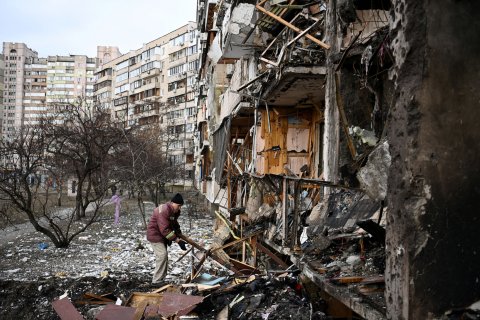
A United States that thought it was pivoting to Asia, and focusing on China—a country that is its preeminent rival going forward—has now been dragged back to Eastern Europe, where for centuries so much blood has been spilled. Putin now has the world's full, undivided attention, in the same way that every Secretary General in the Soviet era did. In chilling televised remarks after the invasion had begun, Putin said, "whoever tries to interfere [in Ukraine] should know that Russia's response will be immediate, and will lead to such consequences that you have never experienced in your history."
Russia is now back in the limelight, a nation that is demonstrating, with a display of military might, that it remains a Great Power. Which is precisely where Putin wants his nation to be. He believes Russia should at all times command respect from the rest of the world, "and when it doesn't command respect, it should command fear," as Lukyanov of Russia in Global Affairs puts it.
Mission accomplished. As Rose Gottemoeller, former deputy secretary general of NATO and a long time Russia watcher characterized it recently on the CBS podcast Intelligence Matters, "This is [Putin's] 'look at me' moment."
The West Responds
Within hours of the invasion, the United States and its allies responded by sharply ratcheting up economic sanctions but it's unclear whether the moves will deter the Russian leader. In a speech announcing the response, Biden said more than half of the West's high tech exports to Russia would be slashed, "degrading their industrial capacity," and hurting industries like aerospace and shipbuilding. He's also freezing the U.S. assets of four additional Russian banks, including VTB, the country's second largest financial institution, whose CEO is very close to Putin. "This is going to impose severe costs on the Russian economy, both immediately and over time," Biden said.
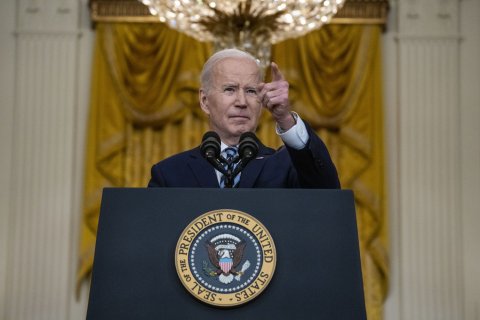
The following day, the White House announced it would join the European Union in implementing sanctions against Putin personally. The Russian President is widely thought to be one of the world's richest men, allegedly hiding much of his wealth in shell companies in various tax havens throughout the world.
How effective the sanctions will be is unclear. Putin, for his part, believes he has effectively made his country sanctions-proof. Russia has over $630 billion in hard currency reserves, and rakes in $14 billion per month in oil and gas exports. As Russia's ambassador to Sweden, Viktor Tatarintsev, told Swedish newspaper Aftonbladet days before the invasion began, when the West ramped up threats of financial penalties in a futile effort to prevent military action, "Excuse my language, but we don't give a shit about your sanctions."
Biden, in his remarks the day the invasion began, said he believes Putin may have brought himself a world of trouble by invading Ukraine. "History has shown time and again how swift gains in territory give way to grinding occupation, acts of mass civil disobedience and strategic dead ends," he said. And in fact, thousands of Ukrainian civilians have been training as part of newly formed "territorial defense organizations" set up in order to resist the Russians.
But U.S. intelligence officials privately do not share Biden's optimism about "mass disobedience." One official who spoke to Newsweek on background because he is not authorized to speak on the record said, "After the government in Kyiv is dismantled, there will be no opposition within Ukraine for us to support militarily."
His pessimism is rooted in Putin's past behavior, most notably when he presided over a scorched earth campaign to brutally put down an insurgency in Chechnya more than 20 years ago. He says, "It's not realistic to mount an opposition campaign. [Putin] does not value human life the same way that the free world does, hence [Russian troops] will eradicate any opposition en masse."
Indeed, Putin's history as a commander in chief of Russia's military shows that there may be reason to doubt Biden's optimism that Ukraine will turn into a quagmire for Moscow. Beyond the ruthless campaign to put down Muslim rebels in Chechnya, he hived off the two sections of the former Soviet state of Georgia that he wanted to control in 2008. Then in 2014 he took back Crimea in Ukraine, and set up separatist movements in two heavily Russian provinces in the east, Donetsk and Luhansk. (The day before the February 24th invasion, Putin declared those two provinces were now "independent republics." )
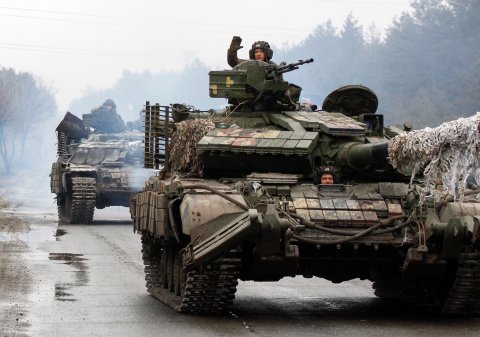
And on the complex battlefield in Syria, where the U.S. and Russians risked conflict, former President Barack Obama funded opposition rebel groups, including some tied to Al Qaeda, then failed to enforce his own red line after President Basar Al Assad used poison gas on his enemies. Putin sent Russian troops in with one goal: that Assad maintain his grip on power. He remains in office to this day.
The Ultimate Goal
What is Putin's endgame now? The Russian leader is fueled by rage and seeks revenge against the West for his homeland's perceived mistreatment, says Peter Rough, a senior fellow at the Hudson Institute, a conservative think tank based in Washington. The country Putin grew up in, and the one he served as a KGB officer, dissolved in 1991. In its stead came chaos at home, and, in Putin's view, betrayal from abroad.
The demise of the Soviet Union, he has famously said, "was the most catastrophic geopolitical event of the 20th century" (worse, even, than World War II, in which 20 million Soviet citizens were killed). His resentment over what happened to his country, particularly in the immediate aftermath of the Soviet collapse, is more widely shared by Russians than many in the West appreciate.
As the Moscow bureau chief for this magazine in the early 2000s, I saw organized crime take over businesses large and small; the country's finances were in shambles. The government was unable to pay the salaries of a once proud military. I interviewed an Army colonel stationed on the Kamchatka Peninsula, in Russia's far east, who wept as he confessed he wasn't able to buy his wife a birthday present a few weeks earlier because he had not been paid his wages in months.
Boris Yeltsin, once the democratic hero who helped bring down the Soviet Union, had turned into a drunken mess as the first freely elected president of Russia; his inner circle was corrupt, enriching themselves as ordinary citizens struggled amidst the post Soviet chaos. On New Year's Day, at the dawn of the new millennium, Yeltsin stepped down. He was replaced by the man he had named Prime Minister months earlier, Vladimir Putin.
Twenty-two years later, in an extraordinary 55-minute speech to his country on Monday February 21, Putin aired many of his grievances in a way he rarely had publicly before, as a prelude to war. In it, he said, "Ukraine is not a separate country," and that "Ukrainians and Russians were brethren, one and the same." Kyiv, in his view, had been ripped unceremoniously from Mother Russia when the Soviet Union dissolved. He then recounted the West's early promise not to expand NATO.
He recalled how coldly then President Bill Clinton responded to his query, not long after he became President of Russia in 2000, about whether Moscow could ever be a member of NATO. He recalled, bitterly, how he was assured that NATO's expansion eastward—to include countries that had been members of the Warsaw Pact, Moscow's former client states—would "only improve their relations with us, even create a belt of states friendly to Russia.
Everything," Putin said, "turned out exactly the opposite. They were just words."
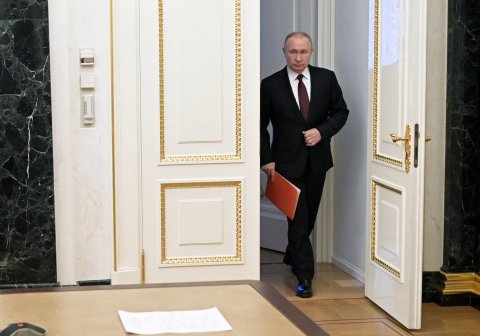
How does Putin seek revenge for this betrayal? To the extent he can, he wants to piece together a new Russian Empire. Not necessarily every province of the former Soviet Union, but those parts of the pre-Soviet empire, established by the Tsars, who were largely Russian speaking, orthodox Christian and who looked first to Kyiv, and then later to Moscow, as the political, cultural and spiritual center of the world.
Putin is a nationalist first and foremost. Ukraine, plainly, is central to this vision. But it also includes the countries—former Soviet provinces—that are now effectively Russian client states (Belarus), as well as those Moscow wishes to control yet again: the Baltic states of Lithuania, Estonia and Latvia (the latter three are now members of NATO, for whom the alliance is obligated to fight in the event one of them is attacked.) Putin in his pre-invasion speech said it was "madness" that the Baltics were ever allowed to leave the USSR. He has demanded—preposterously—that the Alliance pull back to its 1997 stance, when there were just 16 members, as opposed to 30 today.
Point, Counterpoint
It is for that reason that Biden is moving more NATO troops and materiel into the Baltics. On February 25, NATO Secretary General Jens Stoltenberg said the Alliance would for the first time dispatch troops from the Spearhead Unit of its so-called Response Force—formed in 2014—to member states along the eastern front. NATO describes the Response Force as ''highly ready and technologically advanced." It consists of 40,000 troops from a variety of NATO countries. Stoltenberg declined to say precisely how many troops would be deployed now.
More deployments are likely in the months ahead. President Biden vowed in no uncertain terms that an attack on a NATO member would trigger Article 5, the provision that maintains any armed attack against one country in the Alliance is considered an attack against all. If Putin moves on the Baltics, or on any NATO members who formerly were part of the Warsaw Pact—like Poland, Romania or Bulgaria, all of which border Ukraine—then Moscow will be at war with NATO.
With the invasion of Ukraine, analysts believe, Putin hoped to shake NATO. He wanted, says Douglas Wise, a former CIA officer and deputy director at the Defense Intelligence Agency, "to further divide our allies, and cement existing fissures and disunity within [the Alliance] and the EU. He also believes he can benefit by humiliating the Western leaders and institutions when they fail to develop credible and practical options to counter his aggression."
Whether Putin benefits at home for his audacious attack on Ukraine is not yet clear. (There were small protests in major Russian cities in the immediate aftermath of the invasion.) But if creating more stress on NATO was one of his goals, that failed.
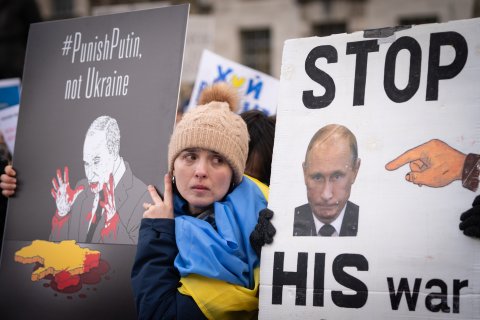
The Germans were widely viewed as the weakest link when it came to Russia, because of the two countries' significant trade ties. And at the outset of the crisis, that skepticism seemed justified. Early on, for example, Estonia wanted to send a batch of old howitizers in its possession to Kyiv. But NATO regulations say that any weaponry given or sold to a non-NATO member must be approved by the country of origin. In this case, that country did not exist: The howitzers had been in possession of the old East Germany. Upon unification, Germany took control of them and ultimately passed them on to Finland, who eventually gave them to Estonia. When Tallinn wanted to send them on to Ukraine, to do its bit to help shore up Kyiv's defenses, Germany—astonishingly—declined to approve the transfer.
That was followed by Berlin's deep reluctance to stop the Nord Stream 2 natural gas pipeline linking Germany and Russia, despite pressure to do so from its own ambassador to the U.S., Emily Haber. Following the refusal, Haber wrote a widely publicized cable to new Chancellor Olaf Scholz, saying that the country was gaining a reputation as a bad ally.
To Putin, this must have indicated that his gas-politik was paying huge dividends. But it didn't last long. Scholz visited Washington in early February and, in a post meeting press conference with Biden, stood by meekly as the president asserted that Nord Stream 2 was dead if Moscow took military action against Ukraine. On cue, hours after the invasion began last month, Germany halted certification of the $11 billion project.
In fact, far from deepening fissures within the alliance, Putin's Ukraine gambit has had the opposite effect. Former CIA Director and Army General David Petraeus, upon returning from the Munich Security Conference shortly before the invasion, said he had never seen the Alliance so unified since the days when he served at NATO headquarters during the Cold War.
The evident unity among the members of what Biden accurately called the most powerful military alliance in history, has only made the plight of Ukraine more poignant. As the invasion unfolded, a member of the Ukrainian parliament in Kyiv, Alexey Goncharenko, begged NATO to impose a no-fly zone, to allow his countrymen to have a fairer fight on the ground. There was zero chance of that happening, because Kyiv wasn't in the club.

Soon now, its desire to be part of the West will be moot, as Putin's Russia takes control—little more than 24 hours after the invasion began, Russian forces were already entering the the capital and Kyiv was hit with Russian "cruise or ballistic missiles." Success is inevitable because Biden and the allies have made it clear that Moscow will not meet military resistance from the West. Over and over Biden has told the American people the U.S. will not fight on the ground in Ukraine. He knows the public has no stomach for it.
If events play out as military analysts now expect, the conflict will end relatively quickly with a negotiated settlement that may cede some territory to Russia, the installation of a new Russia-friendly regime in Kyiv and a partial withdrawal of troops that allows Putin to avoid the quagmire the West so badly wants him sucked into. In doing so, Putin will be able to claim that he dealt a devastating setback to NATO, the main goal of his aggression.
For Putin, the sack of Ukraine will likely mark the endgame in his desire to restore the empire. If it doesn't, it will mean at some point the world's two largest nuclear powers will be in a shooting war, with all the risk that entails. With his words and more importantly his actions, Biden is frantically signaling to Putin: this far, but no further. An anxious world hopes the Russian leader, satisfied with victory in Ukraine, will get the message.

